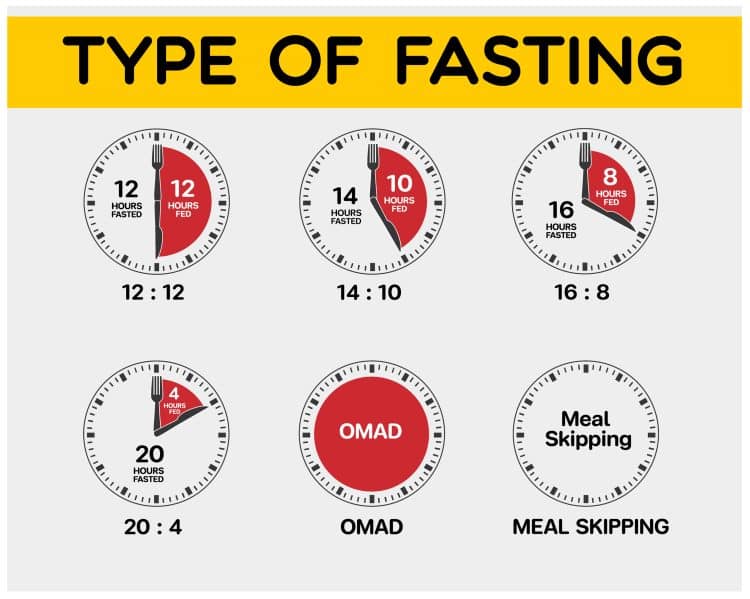Most people use intermittent fasting to lose excess weight. Did you, however, know that intermittent fasting can also help you gain muscle if you follow specific guidelines while exercising and fasting?
Intermittent fasting (IF) is a popular eating pattern; it involves cycling between fasting and eating periods. If combined with a balanced exercise regimen, intermittent fasting can significantly enhance your metabolism and build muscle.
By strategically timing your meals and elongating your fasting windows, you can stimulate muscle growth and optimize your body’s ability to burn fat. Give intermittent fasting a try if you’re ready to take your muscle-building efforts to the next level.
How To Gain Muscle While Intermittent Fasting?

Intermittent fasting is an effective way to lose weight. Research shows that it can also help maintain and build muscle. IF can help with muscle gain in several ways. First, it can increase human growth hormone (HGH) production. HGH plays a crucial role in muscle growth and recovery, and fasting has been shown to increase HGH levels by 2,000%. This can lead to increased strength and growth in muscle mass. [1] [2] [3]
Intermittent fasting can also enhance insulin sensitivity, which is critical for muscle growth. Insulin helps transfer nutrients into cells, including amino acids (the building blocks of protein). By improving insulin sensitivity, your muscles may be better able to utilize these nutrients and support muscle growth. [4]
Additionally, fasting can increase the production of molecules called autophagosomes. They help break down and recycle damaged proteins in the body. This process, called autophagy, can help replace damaged protein cells and support the synthesis of new and healthy proteins. This can support muscle growth and recovery. [5]
Notably, intermittent fasting alone is not enough to achieve muscle gain. A proper exercise program and adequate protein intake are vital for building muscle mass.
If you want to gain muscle with intermittent fasting, three types of exercises are recommended. These are cardio, high-intensity interval training (HIIT), and weight lifting. Again, you also need foods high in protein and low in fat and sugar during the eating window to build muscle and lose excess weight.
Tips For Building Muscle While Fasting
Studies have shown that metabolic hormones like adrenalin increase by up to 180% while you are in a fasted state. The level of somatropin (a growth hormone) is also significantly increased. This is precisely why you can bulk up while practicing intermittent fasting. Adhering to these guidelines will help you gain muscle mass. [6]
Don’t Give Up on Exercise
You must be consistent with your workouts to increase or maintain your muscle mass. Also, eat protein-rich snacks 1-2 hours before your workouts. To optimize muscle growth, consume high-protein foods every few hours during your designated eating window. This will ensure that your body gets enough protein to support your muscle-building efforts.
Experiment with Different Intermittent Fasting Methods

Here are the three IF diets most conducive to muscle gain:
- 5:2 Diet: Eat your regular meals five days a week, and for the remaining two days (non-consecutive), you shall restrict yourself to 500-600 calories per day.
- 16:8 fast: You must eat within an eight-hour feeding window and fast for the remaining 16 hours.
- 800 fast: You will eat 800 calories daily for a fortnight, consuming them in an 8-12 hour eating window.
Eat Mindfully
To build or maintain muscle mass with intermittent fasting, you must pay attention to your diet. Although you’ll be eating a lot of calories in a short period, you must avoid devouring junk food. As losing weight requires a calorie deficit, gaining muscle mass demands a calorie surplus, especially from protein-rich sources like salmon, chicken breast, or whey protein.
You must choose high-quality protein sources instead of relying on fast foods or processed food, which are often high in unhealthy sugars and fat. To support your muscle-building efforts, ensure that you drink adequate water or beverages with zero calories, like unsweetened tea and coffee.
Additionally, ensure you get a good supply of electrolytes like sodium, magnesium, and potassium.
Train in the Morning
You must train at the right time for optimal muscle-building and maintenance results. Research suggests that the optimal times for exercise are in the morning or at least four hours before bedtime. Exercising too close to bedtime will interfere with sleep and hamper muscle recovery.
Choose The Right Exercises
Research has shown that certain types of exercises, like resistance training, can increase muscle sensitivity to insulin. Insulin helps move glucose into the muscles, particularly when glycogen stores in the body are low.

Focus on the below exercises to build muscle mass:
- High-Intensity Interval Training: HIIT, or high-intensity interval training, involves brief periods of intense exercise followed by rest. HIIT has been shown to offer numerous health benefits compared to traditional cardio. These benefits include increased human growth hormone levels, muscle strength and endurance, and improved body composition.
- Cardio Training: Aerobic cardio exercises can be effective for burning fat. However, you must balance your cardio workouts with a sufficient calorie intake to avoid losing lean muscle mass and fat. To promote muscle growth and maintain lean mass while participating in fat-burning cardio, consider incorporating sprints or exercises involving explosive movements and resistance training into your routine.
- Weight Lifting: While lifting weights builds and maintain muscle mass, it is important to consider how your body uses glucose to recover after a heavy lifting session, particularly if you have been fasting. Resistance training puts significant stress on the body, making it essential to refuel soon after the workout.
Workout at the End of the Fasting Period
Exercising toward the end of the fasting period can promote fat burning. Targeted strength training in the fasted state can be incredibly effective, but it is essential to change your workouts routinely to avoid overexertion.
Do Not Abstain From Food For Long Periods
When using fasting as a dietary strategy, it is important to be mindful of your eating window. A smaller window may make consuming all the necessary nutrients more difficult. The 16:8 IF method is effective in this regard, as it involves an eight-hour eating window. This allows for adequate time to consume the needed nutrients while still benefiting from the effects of fasting. It is vital to use fasting consciously to ensure your body gets all the nutrients it needs for proper nourishment and muscle growth.
Your Body is Your Temple; Take Care of It
In addition to maintaining proper hydration, a nutrient-rich diet is essential for healthy muscles. This includes an abundance of vegetables, high-quality protein, and healthy fats. To optimize muscle growth, it is crucial to incorporate long-chain carbohydrates, such as whole-grain pasta or bread, in your meals when you engage in intense training. These can help support muscle recovery. On rest days, a low-carb diet may be a good option. It is also important not to overeat and to allow your body sufficient time to recover.
Scientific Opinion on Intermittent Fasting and Building Muscle
Intermittent fasting has been extensively studied for its impact on weight loss, and research has shown that it can be a valuable strategy for overcoming a weight loss plateau. [7]
However, there have been fewer studies on the intermittent fasting and resistance training combination. Evidence suggests that while individuals practicing intermittent fasting may experience greater weight loss compared to those on a standard diet, their muscle growth and preservation may be similar to those on a regular diet when coupled with resistance training. [8]

You must, however, keep the following tips in mind:
Follow a High-Intensity Training Regimen
Maintaining a muscle-building routine while practicing intermittent fasting can be challenging because muscle growth requires a calorie surplus and adequate protein intake. One issue is that consuming sufficient calories within a limited period can be hard. Another problem is that insufficient calorie intake may hamper your workout performance, impeding muscle and strength building.
Should Be Conducive to Your Lifestyle
Consider whether your work and personal schedule will allow you to time your workouts to coincide with your eating window and consume sufficient post-workout protein to support muscle growth.
Fat Gain is Still a Possibility
Intermittent fasting can only succeed if you eat nutritious foods in the eating window. If you fill that window with unhealthy, high-calorie, high-fat, and high-sugar foods, you may gain weight, but it will likely be fat rather than lean muscle mass.
Does Intermittent Fasting Prevent Fat Gain While Bulking?
Intermittent fasting, combined with the right exercises, will prevent fat gain and help shed body fat. A study that examined how intermittent fasting and weight training three times a week could help prevent fat gain discovered an average fat loss of 1.6 kilograms among the participants. [9]
How Does Calorie Cycling Affect Muscle Gain?
Calorie cycling is a dietary strategy in which the number of calories consumed periodically varies rather than keeping it consistent daily. This can involve consuming a higher number of calories on some days and a lower number of calories on other days. This technique is often used as a weight loss or weight maintenance technique. It is important to carefully plan calorie intake to meet your nutrient needs. You should consult with a healthcare professional or registered dietitian before embarking on calorie cycling.
There is limited research on the impact of calorie cycling on muscle gain. Some studies have suggested that calorie cycling may be beneficial for preserving muscle mass during weight loss, as it may help prevent the body from adapting to a consistent calorie deficit and potentially breaking down muscle tissue for energy.

Does Intermittent Fasting Allow For Leaner Muscle Growth?
Many top athletes believe that the only way to gain muscle is by eating several meals a day while exercising. This leads to the misconception that your body enters a catabolic state where muscles will atrophy and weaken because of a lack of protein and other nutrients. Actually, intermittent fasting can become a useful tool for building muscle with a balanced diet and training program. This is because, during fasting, your body will switch from glucose metabolism to fat metabolism (ketosis) and create ideal hormonal conditions for building muscle.
Frequently Asked Questions
Do you lose muscle mass while fasting?
It is possible to lose muscle mass while fasting, particularly if the fast is prolonged and the individual is not engaging in regular resistance exercise to maintain muscle mass. Consuming adequate amounts of protein during the eating window will help minimize muscle loss.
Can you gain muscle mass while fasting?
It is possible to gain muscle mass during fasting, but it is more challenging. During fasting, the body may be in a calorie deficit, making it more challenging to build body mass. You can support muscle gain through regular resistance training and the consumption of adequate amounts of protein during the feeding windows.
Should you fast intermittently while building muscle?
Yes, you can practice intermittent fasting while building muscle, but it is harder to follow than a regular diet and exercise.
How do I prevent muscle loss while intermittent fasting?
Eat a high-protein diet during your eating windows to ensure you do not lose muscle mass while intermittent fasting.
Final Thoughts
While gaining muscle mass with intermittent fasting is possible, it is considerably more challenging. During fasting periods, the body is in a calorie deficit, making it harder for you to pack on muscle. It is important to plan your schedule and consult a dietitian who can advise you correctly on an intermittent fasting regimen.
Intermittent fasting is an effective way to maintain muscle, but only if you follow the correct eating pattern and work out regularly. It can help you gain muscle and lose fat simultaneously. Remember to eat a high-protein diet and give your body enough time to rest and recover.
Learn more about fasting
- 11 Best Intermittent Fasting Books in 2023 (Review and Ranked)
- 7 Day Water Fast: Your Journey to Rejuvenation and Wellness
- 6 Intermittent Fasting Juice Recipes: Sip Your Way to Success with These Tasty Recipes!
- Eat Stop Eat Intermittent Fasting Decoded: Master Your Metabolism & Lose Weight
- Intermittent Fasting for Weight Loss in Men — The Ultimate Guide
- Fat Loss vs. Weight Loss — Explained!
- Fruit Fasting: The Sweet Path to Wellness
- Foods To Avoid While Intermittent Fasting
References
- “Effects of Intermittent Fasting on Body Composition and Clinical Health Markers in Humans – PubMed.” PubMed, 1 Oct. 2015.
- Moro, Tatiana, et al. “Effects of Eight Weeks of Time-restricted Feeding (16/8) on Basal Metabolism, Maximal Strength, Body Composition, Inflammation, and Cardiovascular Risk Factors in Resistance-trained Males.” PubMed Central (PMC), 13 Oct. 2016.
- Templeman, Iain, et al. “The Role of Intermittent Fasting and Meal Timing in Weight Management and Metabolic Health | Proceedings of the Nutrition Society | Cambridge Core.” Cambridge Core, 26 Apr. 2019.
- Tang, Lixu, et al. “Bigu-Style Fasting Affects Metabolic Health by Modulating Taurine, Glucose, and Cholesterol Homeostasis in Healthy Young Adults.” OUP Academic, 1 Aug. 2021.
- Antoni, Rona, et al. “Effects of Intermittent Fasting on Glucose and Lipid Metabolism | Proceedings of the Nutrition Society | Cambridge Core.” Cambridge Core, 16 Jan. 2017.
- Ho, K. Y., et al. “Fasting Enhances Growth Hormone Secretion and Amplifies the Complex Rhythms of Growth Hormone Secretion in Man.” PubMed Central (PMC).
- Zang, Bo-Ying, et al. “Intermittent Fasting: Potential Bridge of Obesity and Diabetes to Health?” PubMed Central (PMC), 25 Feb. 2022.
- Moro, Tatiana, et al. “Effects of Eight Weeks of Time-restricted Feeding (16/8) on Basal Metabolism, Maximal Strength, Body Composition, Inflammation, and Cardiovascular Risk Factors in Resistance-trained Males – Journal of Translational Medicine.” BioMed Central, 13 Oct. 2016.
- “Effects of Eight Weeks of Time-restricted Feeding (16/8) on Basal Metabolism, Maximal Strength, Body Composition, Inflammation, and Cardiovascular Risk Factors in Resistance-trained Males – PubMed.” PubMed, 13 Oct. 2016.


